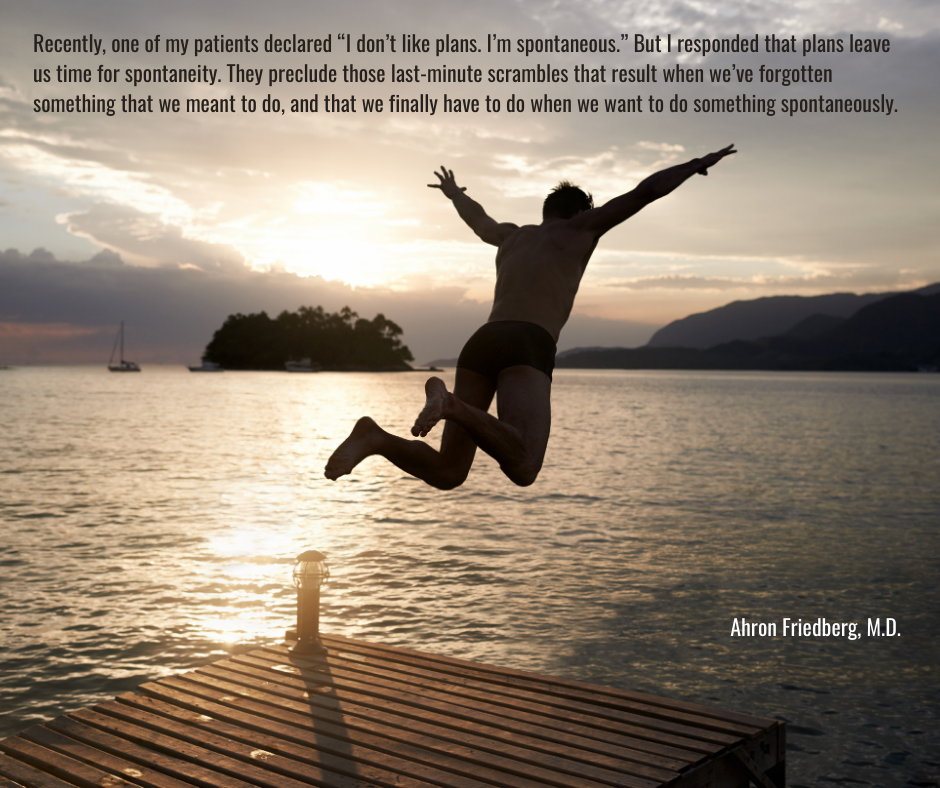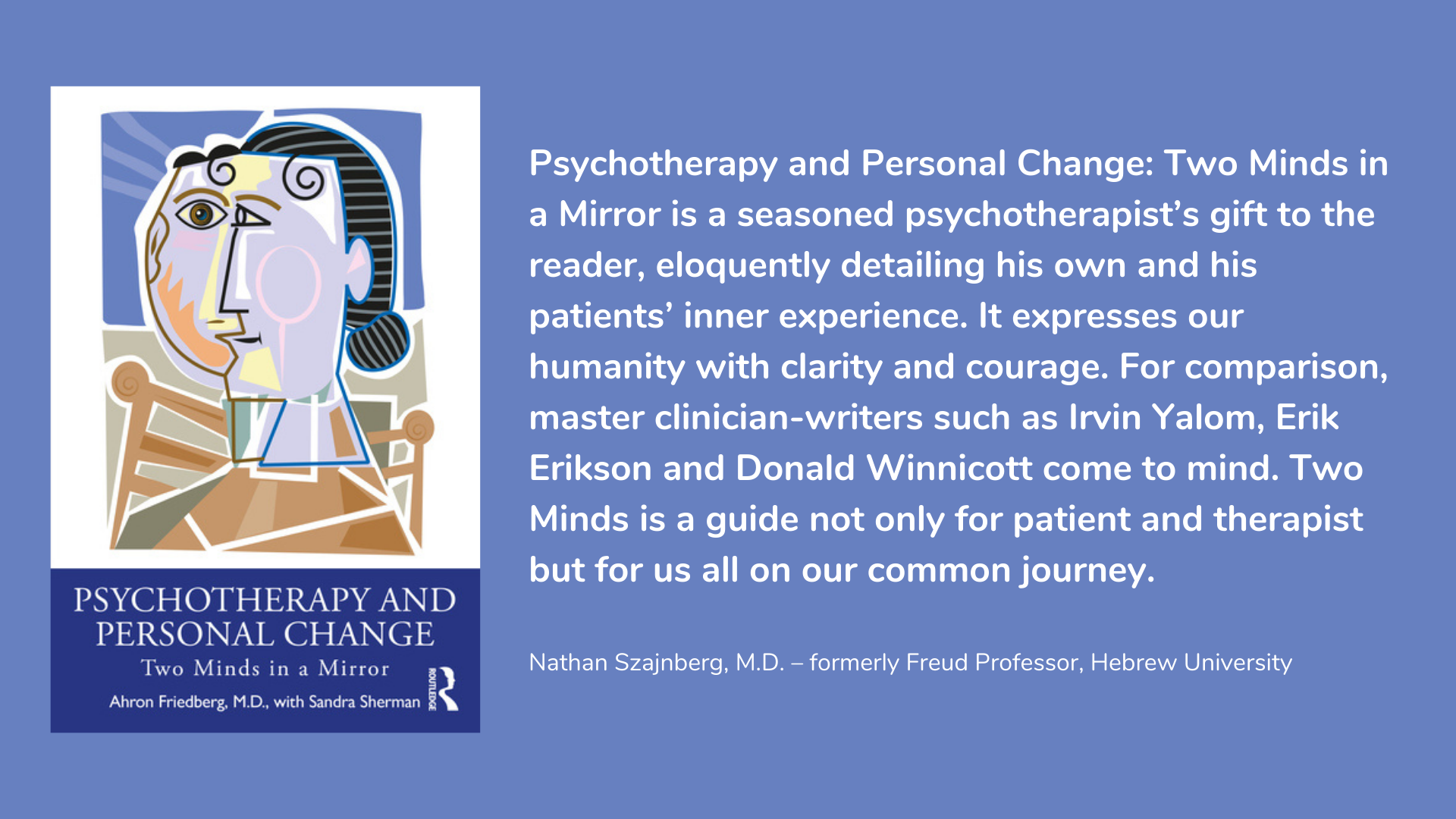Getting Organized
Can Planning Make Us Happy?
In sessions with their patients, psychiatrists on occasion will offer their own experience as a means of establishing connection and demonstrating empathy. Such self-disclosures may also serve as an example. How many times have I caught myself saying “I’ve lost someone, too” or “I’ve had that same disappointment”? Patients take comfort in knowing that we’ve been there, we get it, that loss and suffering afflict both sides of the healing equation.
My patients are, in fact, receptive to what I tell them because they understand that it’s not just from some textbook—it’s from what I’ve learned, from walking down paths that they find themselves on now. I can almost predict their reaction, “Oh, so you know!” … but I’m aware and acknowledge that the voice of experience only goes so far. When I try to provide practical as opposed to emotional advice (“Hey, why not just get the car fixed, instead of worrying about the brakes?”), they have a million excuses. People think they know how to manage their practical affairs, and often fail to see the connection between the mundane concerns of their lives and how they feel about their lives overall.
But there is a profound connection. The pursuit of happiness depends on how we integrate our day-to-day affairs with our emotions, so that at the end of the day—or the week, or the month, or the year—we don’t regret having wasted time, missed an opportunity, or allowed minor situations to get out of hand. That is, what starts out as practical and quotidian can end up (if forgotten, neglected, deferred, or done hastily) as the source of emotional distress, even trauma. So here is my take on how I set myself up for the week ahead. It’s what works for me. But the real point that I want to make is that however you organize yourself, it’s important to be organized—to not let things fall through the cracks of myriad competing demands.
I’m not advocating that you rigidly adhere to some iron routine. When routines override urgent necessities, they do us a disservice. Obviously, you want to exercise judgment. You want to remain flexible and responsive to what legitimately may shift your priorities. But within these broad parameters, it’s good to have a roadmap, a plan for taking care of business.
Allocating time is a crucial part of making plans, since we have to think about how long something may actually take. If we’ve done the same thing before—like getting an annual flu shot—we know that there’s likely to be a line, so we know to allow extra time. If we haven’t done something before, perhaps we should make a similar allowance. What matters is that we not have the experience of losing control, as hours bleed away and we start to worry that our plans are now caput. Pursuing happiness is, in part, the sense that we are living within our means—not just with regard to money, but with regard to time. Rather than feeling disappointed at the end of day (“I really wanted to check out that sale, but I ran so late”), we can formulate reasonable expectations that we’re likely to meet. We don’t have to rush on the one hand while we fall short on the other.
I prepare for the week on Sunday. As the day unfolds, I toggle between anxiety about starting the workweek and eagerness to get on with it. Maybe I have something to prove to myself: I’m still Dr. Friedberg, and I can really do this (can I?). For me, and probably for most people, preparation provides a kind of reassurance. That is, when you see everything all laid out in rows, schedules, and lists, it takes on a concrete reality. It becomes an objective correlative of who you are and what you do. It’s a sort of scaffold on which to build a sense of yourself. When you see your office keys and your wallet right there on the desk (where you can’t miss them on the way out), you have a sense that you’re on your way. The routine takes on a frisson of excitement—there is anticipation, a sense of a goal. Mentally (emotionally!), I’ve put one foot in front of another before I’ve even taken a step out the door.
On Sunday, I go through each patient’s appointment to make sure they’re correct. I think about where we left off and what we’re likely to discuss. I don’t suppose that patients realize this, but psychiatrists often imagine sessions in their heads before they actually occur. They anticipate issues that may come up, and consider possible responses. It’s sort of like playing chess with yourself—if one strategy doesn’t work, you can try another without anyone’s being the wiser. I find it helps to have a sense of what’s likely to come up. You can actually listen better. You’re prepared.
As to the scheduling itself, I know I’m prone to make mistakes. Even though patients have specific “hours,” these tend to move around like tiles on a Rubik’s Cube. Keeping up with dozens of hours is not easy. If you become confused, and as a result a patient is inconvenienced, it sends a terrible message (“He didn’t even care enough to get my time right”). I check and double-check, and sometimes I email a patient to make sure that I’ve gotten any changes they requested. I know that all this nit-picky work sounds like the opposite of pursuing happiness but, as I’ve been suggesting, happiness begins in the humdrum details of ordinary life. In this sense, happiness is simply the opposite of unhappiness, which surely would occur if two patients knock on my door at once. Thus, it’s important not to neglect the little things which, if you’re unlucky, can blow up in your face. In other words, why take the chance?
There’s an assumption in psychiatry that, as regards scheduling, the doctor is always right. But this is a self-serving notion that’s an affront to patients. It bespeaks a sense of hierarchy that interferes with effective therapy, and suggests that patient cannot manage their own lives. If I do make a scheduling error, I own up to it. But I try to prevent this sort of stuff from occurring. In The Checklist Manifesto: How to Get Things Right (2009), Dr. Atul Gawande argues that so much of what we do has become so complex, that it’s crucial to set out in advance the necessary moves (and then ensure the follow-through). Of course, scheduling hardly rises to such complexity, but it’s a good stand-in for what does. Getting my schedule right sets the tone for the week. It makes me feel less likely to miss the bigger stuff.
But planning isn’t all forward-looking, as so far I’ve been suggesting. In some cases, it means deciding what we want to carry with us from the past week into the one coming up. Maybe I got an idea for an essay that I want to explore. Maybe I ran into someone with whom I want to catch up. In this sense, planning is a way of establishing continuity. It allows us to furnish our minds. I’m in a phase of my professional life just now where I’m seriously writing books. This post will appear in the third book I’ve written in the past two years. As I carry on with this writing from one week to the next, I make notes of things that should go into the book. I like to do this on Sunday when I have time to think and sketch out arguments that I want to make. Planning isn’t all about time and lists. It’s about helping yourself turn the stuff of your life into thoughts, patterns, large ideas that help you make sense of your world—and convey that sense to other people. Of course, we’re not all writing books. But we all want to engage the world. By preserving our perceptions, and then ramping them up over time, we can engage the world more deliberately.
OK, there’s that question of spontaneity again. “Dr. Friedberg, do I have to prepare my whole life in advance, even the poems that maybe I’ll write when a butterfly suddenly lands on my nose?” Please! I am not suggesting that life should be all mapped out. But what I do claim is that so many of our ideas are too good to lose because we get distracted by other things. It’s better to write them down and carry them with you, to refer to when you have time to reflect. Part of pursuing happiness is living up to our potential. It gets squandered if we ignore what we know—and ought to know better if we’d just find the occasion to think.
So, making preparations for the week (some mundane, some abstract) is a way both of settling our minds—no more mistakes—and exciting us. It’s as far from being anal and detail-obsessed as it’s possible to be. It’s part of a life strategy that makes the present more present by making space for what we need to do and providing material with which to be creative. Of course, no one can do everything that they set out to do. But by making the right preparations, we can figure out our priorities and how we’ll find the time and wherewithal to achieve them. If disappointment is part of the human condition, we can disappoint disappointment with ingenuity to get things done.
Organization is something you can learn. There are whole books on how to organize your closets, your money, your life. The point is to figure out what you need to organize based on your own personal circumstances. If you don’t write poetry, there’s no need to write down your apercu … unless, maybe, sharing what you’ve seen will give you a sense of joy. So just stop and think. It may be that what you need to organize will not be clear all at once. OK, there’s no rush. When you figure it out, then pursue it. It’s a means of pursuing happiness.
About The Author
Ahron Friedberg, M.D., is Clinical Professor of Psychiatry at Mount Sinai Icahn School of Medicine, New York, and served twice as President of the American Society of Psychoanalytic Physicians. He is Editor of American Academy of Psychodynamic Psychiatry and Psychoanalysis Forum, Book Editor of Psychodynamic Psychiatry.
Essential Reading
www.all-about-psychology.com/psychotherapy-and-personal-change.html



New! Comments
Have your say about what you just read! Leave me a comment in the box below.